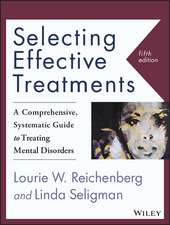Diagnosis and Treatment Planning in Counseling
Autor Linda Seligmanen Limba Engleză Paperback – 14 iul 2004
-An overview of the changing face of counseling, from emerging employment opportunities to core competencies for counselors and trainers.
-A broad range of qualitative and quantitative assessment tools, with guidelines for their selection and interpretation.
-A thorough review of the current edition of the Diagnostic and Statistic Manual of Mental Disorders, including strategies for multiaxial assessment.
-The DO A CLIENT MAP, a comprehensive structured approach to treatment planning.
-Expanded coverage of individual, family, and group interventions
-An updated chapter on documentation, report writing, and record keeping, with sample reports and forms.
-Brand-new chapters on career and organizational development counseling, and ethical standards for counselors.
-A predictions chapter identifying trends most likely to influence the future of the field.
-Case studies, models, and examples throughout.
| Toate formatele și edițiile | Preț | Express |
|---|---|---|
| Paperback (1) | 1293.22 lei 6-8 săpt. | |
| Springer Us – 14 iul 2004 | 1293.22 lei 6-8 săpt. | |
| Hardback (1) | 1299.60 lei 6-8 săpt. | |
| Springer Us – 14 iul 2004 | 1299.60 lei 6-8 săpt. |
Preț: 1293.22 lei
Preț vechi: 1361.28 lei
-5% Nou
Puncte Express: 1940
Preț estimativ în valută:
247.49€ • 257.43$ • 204.32£
247.49€ • 257.43$ • 204.32£
Carte tipărită la comandă
Livrare economică 14-28 aprilie
Preluare comenzi: 021 569.72.76
Specificații
ISBN-13: 9780306485145
ISBN-10: 0306485141
Pagini: 458
Ilustrații: XXIV, 458 p.
Dimensiuni: 152 x 229 x 30 mm
Greutate: 0.66 kg
Ediția:3rd ed. 2004
Editura: Springer Us
Colecția Springer
Locul publicării:New York, NY, United States
ISBN-10: 0306485141
Pagini: 458
Ilustrații: XXIV, 458 p.
Dimensiuni: 152 x 229 x 30 mm
Greutate: 0.66 kg
Ediția:3rd ed. 2004
Editura: Springer Us
Colecția Springer
Locul publicării:New York, NY, United States
Public țintă
Professional/practitionerCuprins
1. The Evolving Role of the Counselor.- 2. Opportunities for the Mental Health Counselor.- 3. Diagnostic Systems and Their Use.- 4. The Use of Assessment in Diagnosis and Treatment Planning.- 5. Intake Interviews and Their Role in Diagnosis and Treatment Planning.- 6. The Nature and Importance of Treatment Planning.- 7. Theories and Strategies of Individual Counseling.- 8. Diagnosis and Treatment Planning for Families.- 9. Assessment and Treatment Planning for Groups.- 10. Counseling For Career and Organizational Development.- 11. Documentation, Report Writing, and Record Keeping in Counseling.- 12. Ethical and Professional Development for Counselors.- 13. Future Trends and Predictions in Counseling.- References.- Table A2. Guide to Using the Tables to Make Diagnoses.- Table A3. Using the Key Questions to Make a Diagnosis.- A3I. Disorders Characterized by Depressed or Elevated Mood.- A3II. Disorders Characterized by Maladaptive Behavior, Impulsivity.- A3IIa. Disorders First Evident inEarly Years.- A3IIb. Sexual Problems.- A3IIc. Eating Problems.- A3IId. Sleeping Problems.- A3IIe. Problems ofImpulse Control.- A3III. Disorders Characterized by Anxiety, not Primarily in Response to Physical Complaints.- A3IV. Disorders Generally Characterized by Medically Unverified Physical Complaints.- A3V. Disorders Characterized by Psychosis.- A3VI. Disorders Characterized by Long-Standing, Pervasive Dysfunction.- A3VII. Disorders Characterized by Cognitive/Memory Impairment or Dissociation.
Notă biografică
Dr. Linda Seligman received the Ph.D. degree in Counseling Psychology from Columbia University. She is a faculty member at Walden University and a faculty associate at Johns Hopkins University. In addition, she is a professor emeritus at George Mason University, where she was codirector of the doctoral program in education and head of the graduate program in Counseling.
Dr. Seligman is a licensed psychologist and licensed professional counselor. She has experience in a variety of clinical settings, including psychiatric hospitals, community mental health centers, substance abuse treatment programs, foster care, corrections, and private practice. She is currently the Director of the Center for Counseling and Consultation, a private practice with offices in Fairfax, Virginia , and Bethesda, Maryland.
Dr. Seligman’s research interests include diagnosis and treatment, planning, counseling people with chronic and life-threatening illnesses, and the mind-body-spirit connection. She has completed 10 books, including Selecting Effective Treatments; Technical and Conceptual Skills for Mental Health Professionals; Systems, Strategies, and Skills of Counseling and Psychotherapy; Promoting a Fighting Spirit; and Developmental Career Counseling and Assessment. She also has authored over 50 professional articles and book chapters. In addition, she has lectured throughout the world on diagnosis and treatment planning.
Dr. Seligman has been the editor of The Journal of Mental Health Counseling and has served as president of the Virginia Association of Mental Health Counselors. She was selected as a Distinguished Professor by George Mason University and as a Researcher of the Year by the American Mental Health Counselors Association.
Dr. Seligman is a licensed psychologist and licensed professional counselor. She has experience in a variety of clinical settings, including psychiatric hospitals, community mental health centers, substance abuse treatment programs, foster care, corrections, and private practice. She is currently the Director of the Center for Counseling and Consultation, a private practice with offices in Fairfax, Virginia , and Bethesda, Maryland.
Dr. Seligman’s research interests include diagnosis and treatment, planning, counseling people with chronic and life-threatening illnesses, and the mind-body-spirit connection. She has completed 10 books, including Selecting Effective Treatments; Technical and Conceptual Skills for Mental Health Professionals; Systems, Strategies, and Skills of Counseling and Psychotherapy; Promoting a Fighting Spirit; and Developmental Career Counseling and Assessment. She also has authored over 50 professional articles and book chapters. In addition, she has lectured throughout the world on diagnosis and treatment planning.
Dr. Seligman has been the editor of The Journal of Mental Health Counseling and has served as president of the Virginia Association of Mental Health Counselors. She was selected as a Distinguished Professor by George Mason University and as a Researcher of the Year by the American Mental Health Counselors Association.
Textul de pe ultima copertă
As the counseling field enters its second century, students and professionals face more challenges than ever before. Linda Seligman’s essential text Diagnosis and Treatment Planning in Counseling has evolved as well, and this third edition synthesizes the latest developments with the spectrum of counseling interventions to create a vital source of practical, up-to-date information. The author recognizes clinicians’ varied roles – mentor, mediator, teacher, coach – and keeps them all in focus, assuring her readers of more effective treatment for clients and steadier footing on their own career paths.
Key features of the third edition:
• An overview of the changing face of counseling, from emerging employment opportunities to core competencies for counselors and trainers.
• A broad range of qualitative and quantitative assessment tools, with guidelines for their selection and interpretation.
• A thorough review of the current edition of the Diagnostic and Statistic Manual of Mental Disorders, including strategies for multiaxial assessment.
• The DO A CLIENT MAP, a comprehensive structured approach to treatment planning.
• Expanded coverage of individual, family, and group interventions
• An updated chapter on documentation, report writing, and record keeping, with sample reports and forms.
• Brand-new chapters on career and organizational development counseling, and ethical standards for counselors.
• A predictions chapter identifying trends most likely to influence the future of the field.
• Case studies, models, and examples throughout.
A worthy addition to any counselor education program, this important volume is equally useful to both beginning and seasoned counselors, whether the setting is the psychiatric clinic, the school, or the rehab center. Seligman clearly sets out the concepts and strategies the reader needs to know to be the flexible, proactive counselor of today – and tomorrow.
Key features of the third edition:
• An overview of the changing face of counseling, from emerging employment opportunities to core competencies for counselors and trainers.
• A broad range of qualitative and quantitative assessment tools, with guidelines for their selection and interpretation.
• A thorough review of the current edition of the Diagnostic and Statistic Manual of Mental Disorders, including strategies for multiaxial assessment.
• The DO A CLIENT MAP, a comprehensive structured approach to treatment planning.
• Expanded coverage of individual, family, and group interventions
• An updated chapter on documentation, report writing, and record keeping, with sample reports and forms.
• Brand-new chapters on career and organizational development counseling, and ethical standards for counselors.
• A predictions chapter identifying trends most likely to influence the future of the field.
• Case studies, models, and examples throughout.
A worthy addition to any counselor education program, this important volume is equally useful to both beginning and seasoned counselors, whether the setting is the psychiatric clinic, the school, or the rehab center. Seligman clearly sets out the concepts and strategies the reader needs to know to be the flexible, proactive counselor of today – and tomorrow.
Caracteristici
Takes a broad look at the process, reviewing tools, and competencies associated with diagnosis and treatment planning in individual counseling, group counseling, family counseling, career counseling, and organizational development








